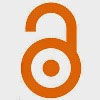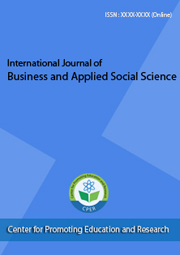Editorial Policies
Focus and Scope
The IJBASS publishes Follow double-blind peer-reviewed papers concerning theory, practice and research in Business and Applied Social Science. The Journal accepts papers presenting new developments in theory and practice, case studies, research articles and papers that review existing work in the area. Specially valued are the articles that integrate therapists' phenomenological experience, clinical thinking, theories and research. The Journal is also open to new ideas in the wider field of Business, Applied Social Science and other Business that may potentially be useful for the development of Business & Applied Social Science.
The journal publishes research papers in the fields of management, marketing, finance, economics, banking, accounting, human resources management, international business, hotel and tourism, entrepreneurship development, business ethics, international relations, law, development studies, population studies, political science, history, geography, industrial relations, information science, library science, media studies, methodology, demography, organizational behavior and theory, strategic management policy, social issues and public policy, management organization, statistics and econometrics, personnel and industrial relations, gender studies, journalism and mass communication, corporate governance, cross-cultural studies, peace and conflict, library and information science, public administration, psychology, philosophy, sociology, women studies, religious studies, social welfare, anthropology, linguistics, education, and so on.
Section Policies
Articles
- Open Submissions
- Indexed
- Peer Reviewed
Peer Review Process
Peer Review:
The International Journal of Business and Applied Social Science (IJBASS) follows double-blind peer review process and is committed to publishing high quality works with significant policy implications and contribution to the literature. The decision about each manuscript is taken following a rigorous process:
The peer review process:
- A unique member of the editorial board will make an initial assessment of the quality and suitability of a submission regarding scope and originality. The editor also checks plagiarism at this stage using Grammarly software. This assessment allows our qualified reviewers to save their time and resource constraints. Paper written within the guidelines regarding the structure of the paper is thus essential.
- Once the designated internal editorial board member is satisfied with the suitability of a submission, it is then sent to two anonymous peer reviewers for their comment.
- The reviewer will assign marks and make a comment about following 6 categories:
- Originality of the paper
- The value of the research question and research gap.
- The soundness of the conceptual and technical or methodological framework.
- Insightful discussion in result and discussion section
- The policy implications of the paper
- Academic writing quality.
- Once the final comments of the reviewers are received, a decision is made about a submission within Four weeks of submission.
Publication Frequency
International Journal of Business and Applied Social Science (IJBASS) are published by Center for Promoting Education and Research (CPER) USA. IJBASS is published 12 times every year.
Open access Policy

IJBASS is a peer reviewed journal with open access. The article processing or delivery of the manuscript submitted to the manager or editor through an online system or by using the OJS Open Access publishing model.
In this publishing model, papers are peer-reviewed in the normal way under editorial control. The paper appears electronically and freely available from our website. Authors can also use articles that have been published in pdf format either for non-commercial use on a personal website or non-commercial institutions. Users have the right to read, download, copy, distribute, print, search, or link to the full text of articles IJBASS.
Archiving
This journal utilizes the LOCKSS system to create a distributed archiving system among participating libraries and permits those libraries to create permanent archives of the journal for purposes of preservation and restoration.
PUBLICATION ETHICS
Research published in the IJBASS must have been conducted in accordance with institutional, national and international guidelines concerning the use of Business & Applied Social Science in research and/or the sampling of endangered species.
IJBASS will do it best to abide by the Code of Conduct of the Committee on Publication Ethics (COPE), and aims to stick on to its Best Practice Guidelines. The following statements describe ethical behavior of all parties involved in the act of publishing an article for IJBASS, i.e.: the author, the Editor, the peer reviewer and the publisher.
The IJBASS editor-in-chief reserves the right to reject manuscripts that do not comply with the above-mentioned requirements. The author will be held responsible for false statements or failure to fulfill the above-mentioned requirements.
Editor's responsibilities
Responsibility
From the outset it must be understood that the Editor has complete responsibility and authority to reject/accept an article. They will only accept an article once it has undergone the Journal’s established processes and when as certain as is reasonably possible that the paper meets accepted academic standards and the rubric as set out by the Journal. The Editor is ever mindful of the issue of conflict of interest with regard to the acceptance or rejection of an article.
Fair play
An editor at any time evaluate manuscripts for their intellectual content without regard to race, gender, sexual orientation, religious belief, ethnic origin, citizenship, or political philosophy of the authors.
Non-Discrimination
In addition to their responsibilities as elaborated above in the ‘Publication processes above, the journal editors are committed to provide timely review to the authors. If a reviewer does not submit his/her report in a timely manner, the paper is instantaneously sent to another qualified reviewer.
The Editor-in-Chief or the other editors would communicate with the authors, as required, briefing them why the paper, in its present shape could not be published.
Confidentiality
The Editor, reviewers, and editorial staff must not disclose any information about a submitted manuscript to anyone other than the corresponding author, reviewers, potential reviewers, editorial team, and the publisher, as appropriate. The Editorial team will take all reasonable steps to protect and preserve the anonymity of the reviewers.
Transparency
When errors are found the Editor commits to ensure the publication of a correction or retraction.
Disclosure and conflicts of interest Unpublished materials disclosed in a submitted manuscript must not be used by any of the editorial board members and reviewers in their own research.
Duties of Reviewers
Contribution to Editorial Decisions
Peer review assists the editor in making editorial decisions and through the editorial communications with the author may also assist the author in civilizing the paper.
Promptness
Any selected referee who feels unqualified to review the research reported in a manuscript or knows that its prompt review will be impracticable should notify the editor and excuse himself from the review process.
Confidentiality
Any manuscripts received for review must be treated as confidential documents. They must not be shown to or discussed with others except as authorized by the editor.
Standards of Objectivity
Reviews should be conducted objectively. Personal criticism of the author is inappropriate. Referees should express their views clearly with supporting arguments.
Acknowledgement of Sources
Reviewers should identify relevant published work that has not been cited by the authors. Any statement that an observation, derivation, or squabble had been previously reported should be accompanied by the relevant citation. A reviewer should also call to the editor's attention any substantial similarity or overlap between the manuscript under consideration and any other published paper of which they have personal knowledge.
Disclosure and Conflict of Interest
Privileged information or ideas obtained through peer review must be kept confidential and not used for personal advantage. Reviewers should not consider manuscripts in which they have conflicts of interest resulting from competitive, collaborative, or other relationships or connections with any of the authors, companies, or institutions connected to the papers.
Reporting standards
Authors of reports of original research should present an accurate account of the work performed as well as an objective discussion of its implication. Underlying data should be represented exactly in the paper. A paper should contain sufficient detail and references to permit others to replicate the work. Fraudulent or knowingly inaccurate statements constitute unethical behaviour and are unacceptable.
Data Access and Retention
Authors are asked to provide the raw data in connection with a paper for editorial review, and should be prepared to provide public access to such data and should in any event be prepared to retain such data for a reasonable time after publication.
Originality and Plagiarism
Authors should adhere to publication requirements that submitted work is original, is not plagiarized, and has not been published elsewhere-fraudulent or knowingly wrong statements constitute unethical behavior and are unacceptable. If an author has used the work and/or words of others, that this original is been appropriately cited or quoted and accurately reflects individuals’ contributions to the work and its reporting.
Multiple, Redundant or Concurrent Publication
An author should not in general publish manuscripts describing essentially the same research in more than one journal or primary publication. Submitting the same manuscript to more than one journal concurrently constitutes unethical publishing behaviour and is unacceptable.
Acknowledgement of Sources
Proper acknowledgment of the work of others must always be given. Authors should cite publications that have been influential in determining the nature of the reported work.
Authorship of the Paper
Authorship should be limited to those who have made a major contribution to the conception, design, execution, or interpretation of the reported study. All those who have made significant contributions should be listed as co-authors. Where there are others who have participated in certain substantive aspects of the research project, they should be acknowledged or listed as contributors.
The corresponding author should ensure that all appropriate co-authors and no inappropriate co-authors are included on the paper, and that all co-authors have seen and approved the final version of the paper and have agreed to its submission for publication.
Disclosure and Conflicts of Interest.
All authors should disclose in their manuscript any financial or other substantive conflict of interest that might be construed to influence the results or interpretation of their manuscript. All sources of financial support for the project should be disclosed.
Fundamental errors in published works
When an author discovers a significant error or inaccuracy in his/her own published work, it is the author’s obligation to promptly notify the journal editor or publisher and cooperate with the editor to retract or correct the paper.
Plagiarism
All work in the manuscript should be free of any plagiarism, falsification, fabrications, or omission of significant material.
Authors are expected to openly cite others' work and ideas, even if the work or ideas are not quoted verbatim or paraphrased. This standard applies whether the previous work is published, unpublished, or electronically available. Failure to properly cite the work of others may comprise plagiarism. Plagiarism in all its forms constitutes unethical publishing behavior and is unacceptable.
Before Article is accepted, article will check within https://www.grammarly.com






